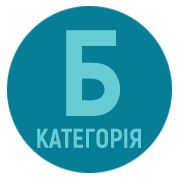TEACHING GENRE DIVERSITY IN FOREIGN LANGUAGE ACADEMIC WRITING TO STUDENTS OF THE SECOND (MASTER’S) LEVEL OF HIGHER EDUCATION
DOI:
https://doi.org/10.32782/2307-1222.2025-59-28Keywords:
academic writing, plagiarism, critical thinking, scientific article, artificial intelligenceAbstract
The article is devoted to mastering the genre diversity of foreign language academic writing of applicants for the second (master’s) level of higher education, which is an important stage in the training of specialists capable of effective communication in the scientific environment at the international level. It is emphasized that in this context, academic writing acts not only as a tool for the transfer of knowledge, but also as an important component of the development of critical thinking, analytical abilities and communication skills. The article discusses the key aspects of teaching genre diversity in academic texts to undergraduates, the specifics of working with different genres of academic texts, and the importance of taking into account intercultural and linguistic features when writing academic papers.It is noted that teaching genre diversity aims not only to teach students how to write correctly in accordance with the requirements of specific genres, but also to promote the development of their cognitive and linguistic abilities. An important component of the process is the development of the ability to independently analyze, synthesize, and interpret scientific information. The issue of compliance with the requirements of academic integrity is elaborated in detail. It is noted that it is important to teach students not only the technical aspects of writing, but also to develop their interest in scientific activity, which helps to form a high level of academic and professional responsibility. The use of various digital tools allows students to simplify the process of organizing information, checking for plagiarism, and structuring the text, which in turn helps to facilitate the teaching of genre diversity. Thus, an integrated approach is necessary for the training of highly qualified specialists who will be able to successfully integrate into the international scientific space, adhering to high standards of academic integrity, scientific ethics and professionalism.
References
Академічне письмо : навчальний посібник / уклад. : Т. Костирко та ін. Миколаїв : НУК, 2022. 116 с.
Академічне письмо та доброчесність : навчально-методичний посібник / І. Насмінчук, Л. Громик. Кам’янець-Подільський : ЗВО «ПДУ», 2024. 256 с.
Вихрущ А. Академічне письмо: структура і завдання. Медична освіта. 2021. Вип. 1. С. 112–116. https://doi.org/10.11603/me.2414-5998.2021.1.11979.
Гончаренко-Закревська Н., Дюканова Н. Шляхи поліпшення іншомовної академічної грамотності у ВНЗ. Наука і техніка сьогодні. Серія «Педагогіка». 2022. Вип. 1 (1). С. 27–37.
Городжа Л. Наукова стаття: як написати та опублікувати в рейтинговому виданні : методичні рекомендації. Київ : Інститут електродинаміки НАН України, 2020. 48 с.
Ільченко О. Англійська для науковців. The Language of Science : підручник. 2 вид., доопрац. Київ : Наукова думка, 2010. 288 c.
Карчевський М. Правове регулювання штучного інтелекту: ризик-орієнтований підхід у європейській дискусії. Актуальні питання права та соціально-економічних відносин : збірник статей. Кропивницький, 2023. С. 20‒29.
Патієвич О. Організація процесу навчання англомовного академічного письма студентів магістратури в умовах експерименту. Педагогіка формування творчої особистості у вищій і загальноосвітній школах. 2018. Вип. 61. Т. 2. С. 151–156.
Про авторське право та суміжні права : Закон України № 2811–IX від 01.12.2022 р. URL: https://zakon.rada.gov.ua/laws/show/2811-20.
Про академічну доброчесність : проєкт закону від 08.01.2024 р. № 10392. URL: https://zakon.rada.gov.ua/laws/show/3789-20#Text.
Про освіту : Закон України від 05.09.2017 р. № 2145–VIII. Відомості Верховної Ради України. URL: https://zakon.rada.gov.ua/laws/show/2145-19#Text.
Річний звіт Національного агентства із забезпечення якості вищої освіти за 2023 р. Київ, 2024. 109 с. URL: https://naqa.gov.ua/wp-content/uploads/2024/05/%D0%97%D0%B2%D1%96%D1%82-2023.pdf.
Сінченко Д. Плагіат в українській освіті. Як організовано боротьбу з явищем в регіональних вишах. Український тиждень. 2021. URL: https://tyzhden.ua/plahiat-v-ukrainskij-osviti-iak-orhanizovano-borotbu-z-iavyshchem-v-rehionalnykhvyshakh/.
Тітов С. Інформаційно-освітнє середовище навчального закладу: розвиток засобів і способів комунікаційної й інформаційної взаємодії. Вісник Харківської державної академії культури. 2014. Вип. 3. С. 144–150.
Філіпенко Л., Думанський О., Козак О. Академічна доброчесність у науковому та освітньому середовищі закладів освіти України: погляд крізь призму наявності штучного інтелекту. Академічні візії. 2023. Вип. 19. С. 1–9.
Харченко І. Формування навичок академічного письма в майбутніх фахівців нефілологічного профілю в умовах інформаційно-освітнього середовища. Актуальні питання гуманітарних наук. 2023. Вип. 64. Т. 2. С. 347–351.
Яхонтова Т. Основи англомовного наукового письма : навчальний посібник для студентів, аспірантів і науковців. 2 вид. Львів : ПАІС, 2003. 220 с.
Яхонтова Т. Лінгвістична генологія наукової комунікації : монографія. Львів : Вид. центр ЛНУ ім. І. Франка, 2009. 420 с.
Bourdieu P., Passeron M. Academic Discourse: Linguistic Misunderstanding and Professional Power. Stanford : Stanford University Press, 1994. 144 p.
Morley J. The Academic Phrasebank: an academic writing resource for students and researchers. 2018. URL: https://www.academia.edu/49082519/The_Academic_ Phrasebank_by_Dr_John_Morley_University_of_Manchester_.
Richards J.C., Miller Sh.K. Doing Academic Writing in Education Connecting the Personal and the Professional. Connecting the Personal and the Professional. Mahwah, New Jersey ; London : Lawrence Erlbaum Associates ; Publishers, 2005. 213 p. URL: http://ndl.ethernet.edu.et/bitstream/123456789/8418/1/199.pdf.pdf.
Swales J.M., Feak C.B. Academic Writing for Graduate Students: Essential Tasks and Skills. Second edition. Ann Arbor : The Univ. of Michigan Press, 2004. 332 p.










